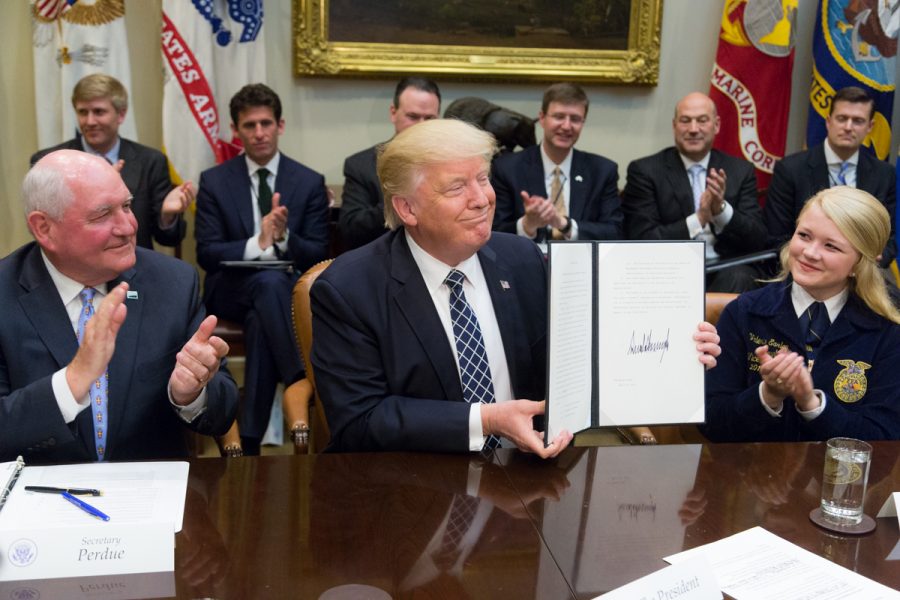Smith: Trump’s emergency is another misguided negotiation
President Donald Trump displays the signed Executive Order promoting Agriculture and Rural Prosperity in America during a roundtable with farmers and agricultural commissioners in the Roosevelt Room of the White House in Washington, D.C., Tuesday, April 25, 2017. (Official White House Photo by Shealah Craighead)
February 22, 2019
I believe that the best quality a president can have is an aptness for negotiation.
Rarely in life, especially in politics, do we achieve our goals to the fullest extent. No matter how much one believes their solution will remedy a problem, it is important to know that our perspective is impossibly narrow. Thus, facts should guide the conversation, and we should always be willing to be wrong while still arguing our point of view and game-changing ideas.
Though the American public was not present in the negotiation room while this bipartisan compromise was being drafted, it is apparent that Congress performed its duty. According to the data and statistics that inform the issue of border security, the appropriated funds and its intended purpose seem to adequately address present problems.
For this, we can thank our representatives. They’ve essentially avoided another national tragedy. The consequences of having the government closed for 35 days caused so much turmoil within the American consciousness. And that doesn’t include the material negative effects it enacted.
But what’s perhaps most painful is the fact that the president was considering a course in which the same tragedy would happen again.
It’s beginning to seem as though the American public and our best interest is not the priority of our commander in chief. The declaration of a national emergency is another instance of this pattern. If these funds are being used for what can factually be ruled out as an emergency, what happens if an actual emergency emerges while the current funds have been sanctioned for the southern border wall? Isn’t this a ripe opportunity for American adversaries? Aren’t we crippling our ability to respond to true threats?
I think there is enough coverage complaining about this national emergency. I don’t want this article to be about that. I’m more fascinated by the lasting effect this will have on the Republican Party.
This declaration has fractured the party, causing top rank-and-file Republicans to completely counter this use of executive privilege. Where will the party stand when Donald Trump is gone? I think the time is coming very quickly when politicians will be evaluated on who supported Trump and who didn’t.
Whether the leadership likes to admit it or not, the southern border wall is critical to Trump’s 2020 campaign. One could argue that it is the reason why his poll numbers have risen lately. Not only has the shutdown nonsense ceased, but there is a more streamlined path to getting the southern border wall. And because there is a healthy portion of the country that still supports/advocates for a southern border wall, it is reasonable to assume that his candidacy will be highly questioned if he is not able to deliver on this campaign promise.
This shifts the onus to the courts since this is where the fight will play out. The big question is: Can a president declare a national emergency on an issue that is mostly political in nature?
Truthfully, this could play out either way. I’d like to believe that truth would prevail and this would be defeated in the courts, but it is just as likely that it won’t. If it is not, then the presidency gets new levels of executive privilege as well as a logistical nightmare on our southern border.
If anything, this president is most effective at galvanizing his base. If he stands to lose a fight within the courts, the campaign propaganda of “government corruption” could possibly become more effective—with Trump blaming his failures on the connivings of corrupt politicians.
Whatever path this emergency follows, the conclusion will be a fractured Republican Party, one that will struggle to find its identity. Currently there is no one in the Democratic Party that is powerful enough to capture the American attention like Trump has.
But when that individual arises, the game will be permanently changed, and the GOP will suffer as a result.
Josiah Smith is a fourth-year English and business management double major.



